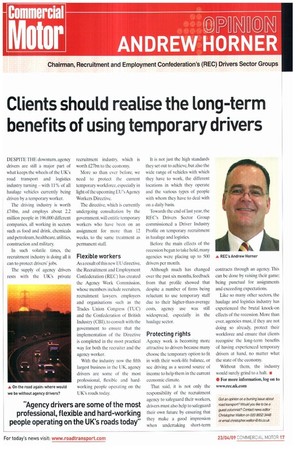Clients should realise the Long-term benefits of using temporary drivers
Page 17

If you've noticed an error in this article please click here to report it so we can fix it.
DESPITE THE downturn, agency drivers are still a major part of what keeps the wheels of the UK's road transport and logistics industry turning — with 11% of all haulage vehicles currently being driven by a temporary worker.
The driving industry is worth I:74bn, and employs about 2.2 million people in 196,000 different companies, all working in sectors such as food and drink, chemicals and petroleum, healthcare. utilities, construction and military.
In such volatile times, the recruitment industry is doing all it can to protect drivers' jobs.
The supply of agency drivers rests with the UK's private recruitment industry. which is worth £27bn to the economy.
More so than ever before, we need to protect the current temporary workforce, especially in light of the upcoming EU's Agency Workers Directive.
The directive, which is currently undergoing consultation by the government, will entitle temporary workers who have been on an assignment for more than 12 weeks, to the same treatment as permanent staff.
Flexible workers As a result of this new LU directive. the Recruitment and Employment Confederation (REC) has created the Agency Work Commission, whose members include recruiters, recruitment lawyers. employers and organisations such as the Trades Union Congress (TUC) and the Confederation of British Industry (CBI), to consult with the government to ensure that the implementation of the Directive is completed in the most practical way for both the recruiter and the agency worker.
With the industry now the fifth largest business in the UK, agency drivers are some of the most professional, flexible and hardworking people operating on the UK's roads today. It is not just the high standards they set out to achieve, but also the wide range of vehicles with which they have to work, the different locations in which they operate and the various types of people with whom they have to deal with on a daily basis.
Towards the end of last year, the REC's Drivers Sector Group commissioned a Driver Industry Profile on temporary recruitment in haulage and logistics.
Before the main effects of the recession began to take hold, many agencies were placing up to 500 drivers per month.
Although much has changed over the past six months, feedback from that profile showed that despite a number of firms being reluctant to use temporary staff due to their higher-than-average costs, agency use was still widespread, especially in the haulage sector.
Protecting rights Agency work is becoming more attractive to drivers because many choose the temporary option to fit in with their work-life balance, or see driving as a second source of income to help them in the current economic climate.
That said, it is not only the responsibility of the recruitment agency to safeguard their workers, drivers must also help to safeguard their own future by ensuring that they make a good impression when undertaking short-term contracts through an agency. This can be done by raising their game; being punctual for assignments and exceeding expectations.
Like so many other sectors, the haulage and logistics industry has experienced the brutal knock-on effects of the recession. More than ever, agencies must, if they are not doing so already, protect their workforce and ensure that clients recognise the long-term benefits of having experienced temporary drivers at hand, no matter what the state of the economy.
Without them, the industry would surely grind to a halt. • • For more information, log on to www.ree.iik.com
















































































































































